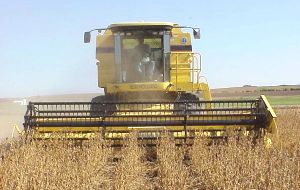MercoPress. South Atlantic News Agency
Argentina: grain and oilseeds export levies become permanent

Argentina hiked export taxes on soy and sunflower seed products by between seven and nine percentage points and decreased levies on corn and wheat exports by one point to expand supplies of key food staples in the domestic market.
The Tuesday announcement by Economy minister Martin Lousteau in practical terms means soy and sunflower will be levied 44.1% and 39.1% while corn and wheat 24.2% and 27.1%. He also said export taxes will correlate to commodities international prices oscillations. Earlier in the day the Agriculture Secretariat had closed the grains exports registries for two days, fuelling expectations the government was about to announce fresh hikes in export duties on agricultural goods. "This is the first time in a long time that with commodities' prices increasing there's a rebate in export duties on some grains", said Lousteau in Argentina's Government House, Casa Rosada, sitting next to Agriculture and Economic Policy secretaries, Javier de Urquiza and Gaston Rossi. Lousteau said the new system contemplates that as commodities prices increase so does the levy, which means it will have a lesser impact on the domestic market. Similarly when the international price drops, so does the levy, meaning farmers will have an incentive to keep producing. He added the "new system would be in place for the next four years". However Lousteau also promised specific incentives for cereal, beef and dairy farming and stimuli to generate added value and a great use of fertilizers. Lousteau indicated that the greater levy on soybeans puts prices back to their December level and "if we had used the same system for wheat and corn, we would have had to increase the levy five percentage points. But we've lowered them because we want to promote production of these two grains, which are basic diet for Argentines". No word was mentioned about export levies on finished goods derived from grains and oil seeds such as cooking oils and flours. "These measures are geared to a greater balance inside the farming industry, a greater decoupling of international and domestic prices, geared to a greater production both to satisfy world demand but at the same time guaranteeing reasonable prices for Argentine families", argued Lousteau. For the Argentine treasury, if commodities prices remain at their current level, means an additional 1.3 billion US dollars (0.4% of GDP), according to the Buenos Aires press ensuring the administration of President Cristina Fernandez de Kirchner a primary surplus in the range of 4% of GDP, as announced on her taking office speech before Congress. But Argentine farmers taken by surprise by the new hikes are furious and anticipate a year of conflict and protests "similar to 2006". The previous Kirchner administration not only imposed the export tax system but also banned grain, beef and dairy exports whenever it felt domestic prices were climbing and threatening the consumer prices index. Farmers have yet to decide on specific measures but have also complained bitterly that in spite of appointment requests with President Cristina Kirchner, Cabinet Chief Jorge Fernandez and Martin Lousteau none has become effective. "This is going to be a heavy ammo year, like 2006", said Mario Llambías president of the Argentine Rural Confedereations. Llambías said he does not believe that the announced export levies system will promote corn and wheat, and prevent soybeans from keeping expanding. Secondly this is "the end of the futures market, because with changing levy percentages risk increases" and so does the need for greater coverage.




Top Comments
Disclaimer & comment rulesCommenting for this story is now closed.
If you have a Facebook account, become a fan and comment on our Facebook Page!